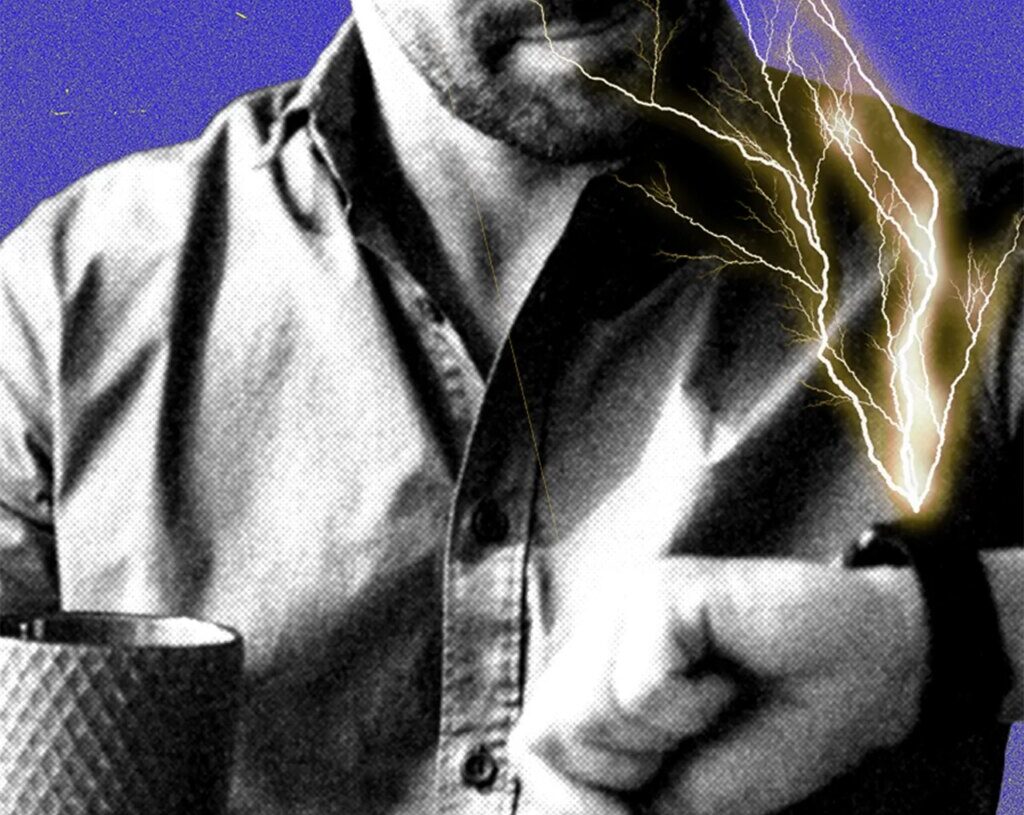Forget coffee, you can now stay alert by strapping on a wristband that lightly zaps you awake. That’s what eCoffee Energyband, a Chinese gadget that sells for just over $100, is claiming to do.
First released in late 2023, the product is a lightweight wearable with two electrode pads that sit against the inner wrist. WAT Medical, a Canadian company with a Chinese subsidiary making and marketing the device, claims the mild electrical signals sent by the wristband can keep wearers alert by stimulating nerves in the brain. The effect is supposedly about the same as a cup of coffee, minus the risk of caffeine addiction. The only side effect is that your hand could feel numb from the tip of the finger to the inner wrist, the company says, so the makers suggest that it only be worn for three hours a day, and users can switch which wrists they put it on.
The gadget would likely have stayed in relative obscurity if the company that makes it had not attended a recent Chinese trade show, whereafter it suddenly went viral. “The purpose of inventing this eCoffee Energyband is not to replace coffee. Coffee is great, but it’s not always suitable for the afternoon or evening. But we still have the need to feel refreshed during those times,” Xu Haojie, the company’s director of operations, told Chinese state media Xinhua at the trade show. After wearing it, the Xinhua reporter said, “It feels like I’m being gently tapped. I can feel the electric pulse.”
It immediately became a sensation online. On Chinese ecommerce websites, including JD and Taobao, the device appears to be sold out as of now, with hundreds of mixed reviews from buyers. The device is also sold and shipped to markets around the world. The website lists its normal price at $130, with a holiday promotion going on right now that knocks 30 percent off the price.
But on Chinese social media, the wristband has been met with overwhelming sarcasm and skepticism.
The company’s marketing frames eCoffee as a productivity booster, a tool for getting more study and work done. But that message has struck a chord with Chinese people’s resentment
toward “996” culture, the local variant of the grind culture. The young generation in China is increasingly recoiling from workplace burnout. Snarky commentators online called the wristband everything from a portable electric chair to the human version of dog-training e-collars and livestock whips, emphasizing how it benefits the managerial class against the will of the working class.
“Brilliant. Which unhinged genius came up with this? Instead of taking a rest when I feel tired, I’ll just electrocute myself instead,” Chinese comedian Ma Xiaoyang said in a standup performance in early November, posted on her Xiaohongshu feed. She also compared it to the torture tactics that scam compounds in Southeast Asia famously use on human trafficking victims, “Now you can experience what it’s like to live at a scam compound anytime you want. Amazing.”
To be fair, much of the online pushback has less to do with whether the gadget actually works but with what it represents. Unlike some of its Western predecessors (like an alarm clock that shocks you to wake you up), the wristband is not just an electric shock machine. Experts tell WIRED that they believe it actually can stimulate the nervous system if worn correctly. But those experts question whether that stimulation comes with the claimed benefit of keeping you awake. WAT Medical did not respond to WIRED’s request for comment.
Shaky Claims
The eCoffee page on the company’s website lists five academic papers as evidence of the device’s effectiveness, but in actuality, those research reports either focus on the theoretical effect of nerve stimulation or experiments conducted with quite different devices.
“I think that it would require some rigorous and carefully conducted clinical studies to really demonstrate this,” says Omer Inan, a professor at Georgia Institute of Technology, who has experience engineering similar devices stimulating the nerves on the wrist. “There are many challenges to this type of stimulation, and the specific concept of increasing cerebral blood flow and neurotransmitter levels would really need to be supported by evidence.”
The web page for eCoffee lists academic research, proprietary patents, and medical trials, all of which build an image of a scientifically proven solution. But some of that evidence falls apart on closer inspection.
For example, the Chinese web page marketing the eCoffee wristband mentions the company has a patent for “targeted precise median-nerve electrical stimulation technology.” But the actual patent connected to the serial number is merely a design patent for the look of the wristband, according to a database by China’s National Intellectual Property Administration. The patent doesn’t actually protect any technological mechanism inside the device.
The same page also boasts a clinical study the company has conducted with Naval Medical University in China where researchers tested a similar wristband by the company on patients who’d feel nausea after surgery. While the research found that the wristbands helped prevent vomiting, it also noted they had no significant effect on nausea. But the product page misrepresented the research as saying the wristbands were “significantly effective on 86 percent of the people for reducing nausea and vomiting.”
The company’s English website also has a FAQ page where it answers a question about clinical proof. It says the company is working with Özgür Leylek, a Turkish doctor, on doing clinical studies in the European Union. But online information shows that Leylek specializes in aesthetic gynecology, and not the nervous system. Leylek did not immediately respond to a request for comment.
Lack of Scientific Evidence
When it comes to eCoffee specifically, here’s what the company claims is its working mechanism: The device will send an electrical signal to the median nerve, which connects the hands to the nervous system. The targeted signal, as it claims, would travel up to the head to impact the vagus nerve, a crucial nerve that regulates body functions like heart rate, stress, and digestion. Stimulating this nerve leads to the body staying more alert.
A part of that process is backed by science. For example, it’s true that stimulating the vagus nerve could help people concentrate, says J. Douglas Bremner, a professor of psychiatry and radiology at Emory University School of Medicine, whose peer-reviewed research is cited by eCoffee on its website. Bremner’s research uses a device on the neck to stimulate the vagus nerve of patients with stress-related psychiatric disorders and found positive results. “I’ve done it myself. And when you stimulate it, it makes you feel a little bit more concentrated,” Bremner tells WIRED.
What’s not proven, however, is that stimulating the nerves in the wrist would have the same effect. “The vagus nerve does not directly connect to the median nerve, though there is some literature that suggests stimulating the median nerve can activate the vagus due to proximity in the neck,” says Tracy Centanni, an associate professor at the University of Florida, who studied the impact of stimulating the vagus nerve on language learning. She says it’s unclear if wristbands could achieve similar results as more conventional stimulating devices applied on the ear or the neck. “Just stimulating the brain isn’t enough—you need to stimulate specific brain regions to get these promised effects,” she says.
Bremner has collaborated with Inan at Georgia Tech to begin studying the nerves in the wrist. But that work is still ongoing, and he doesn’t know the full picture yet. It’s possible that devices like eCoffee could have a similar effect to the brain and the body, but it’s not proven yet, Bremner says.
Not a Medical Treatment, but a Lifestyle
The lack of scientific evidence for effectiveness also means such gadgets are increasingly pushed to the public as not medical treatment, but a lifestyle tool. Think of it as a more sophisticated (and certainly more expensive) stress ball, which also helps some people concentrate on work. Bremner says there have been startups in the US working on wearable gadgets that stimulate the nervous system through electrical signals. But these companies have had difficulty getting FDA approval to use them in clinical settings, so instead they are pivoting to market the same device as lifestyle enhancement gadgets that reduce stress.
Since these devices don’t claim they have a medical benefit, it’s much harder for consumers to really know whether they are effective, like this review of another wristband that says it can “activate your vagus nerve” through vibrations. Centanni has seen another device marketed to menopausal women with the goal of relieving hot flashes, but without good data proving its efficacy, she suspects there’s merely a placebo effect that makes the wearer feel it’s working.
Meanwhile, the company behind eCoffee has taken the idea of stimulating wrist nerves in several directions to arrive at some novel applications. WAT Medical makes a wristband that claims to prevent nausea and vomiting, and another one that claims to suppress appetite and therefore “reduce obesity.” Inan, who has worked on wrist nerve stimulating devices, says he has never heard of similar gadget ideas in the West. “I am not sure there is any direct connection to these aspects,” he says.
The post A Viral Chinese Wristband Claims to Zap You Awake. The Public Says ‘No Thanks’ appeared first on Wired.




